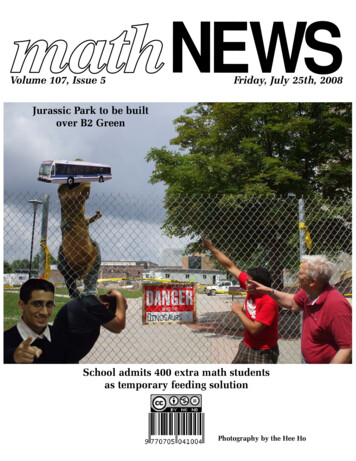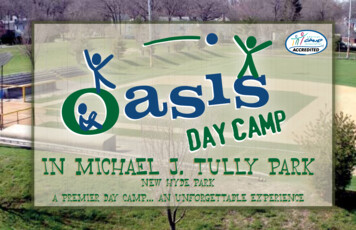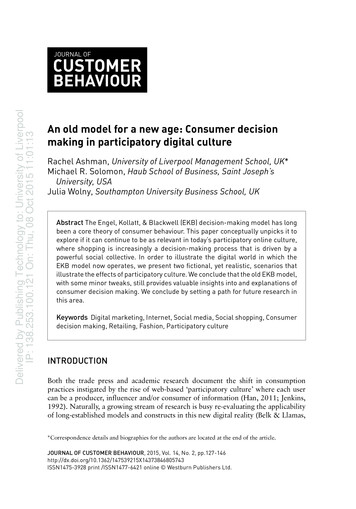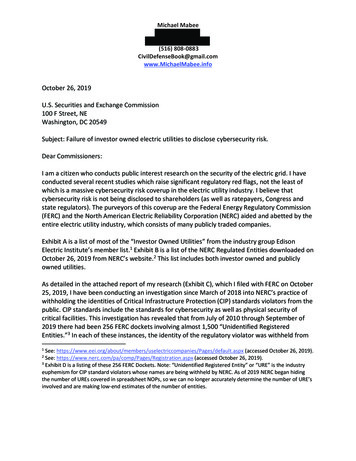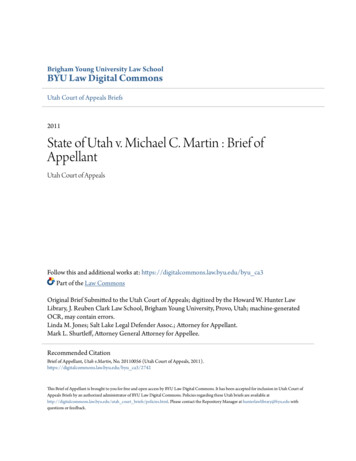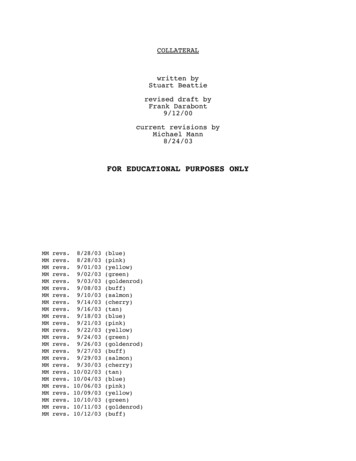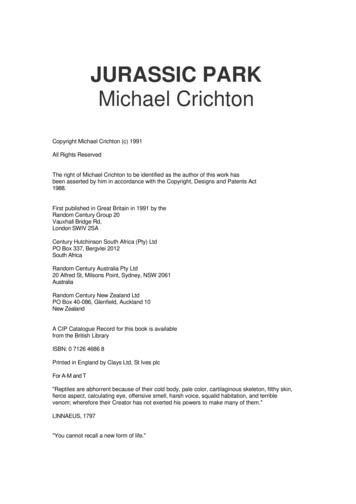
Transcription
JURASSIC PARKMichael CrichtonCopyright Michael Crichton (c) 1991All Rights ReservedThe right of Michael Crichton to be identified as the author of this work hasbeen asserted by him in accordance with the Copyright, Designs and Patents Act1988.First published in Great Britain in 1991 by theRandom Century Group 20Vauxhall Bridge Rd,London SWIV 2SACentury Hutchinson South Africa (Pty) LtdPO Box 337, Bergvlei 2012South AfricaRandom Century Australia Pty Ltd20 Alfred St, Milsons Point, Sydney, NSW 2061AustraliaRandom Century New Zealand LtdPO Box 40-086, Glenfield, Auckland 10New ZealandA CIP Catalogue Record for this book is availablefrom the British LibraryISBN: 0 7126 4686 8Printed in England by Clays Ltd, St Ives plcFor A-M and T"Reptiles are abhorrent because of their cold body, pale color, cartilaginous skeleton, filthy skin,fierce aspect, calculating eye, offensive smell, harsh voice, squalid habitation, and terriblevenom; wherefore their Creator has not exerted his powers to make many of them."LINNAEUS, 1797"You cannot recall a new form of life."
ERWIN CHARGAFF, 1972Introduction"The InGen Incident"The late twentieth century has witnessed a scientific gold rush of astonishing proportions: theheadlong and furious haste to commercialize genetic engineering. This enterprise has proceededso rapidly-with so little outside commentary-that its dimensions and implications are hardlyunderstood at all.Biotechnology promises the greatest revolution in human history. By the end of this decade, itwill have outdistanced atomic power and computers in its effect on our everyday lives. In thewords of one observer, "Biotechnology is going to transform every aspect of human life: ourmedical care, our food, our health, our entertainment, our very bodies. Nothing will ever be thesame again. It's literally going to change the face of the planet."But the biotechnology revolution differs in three important respects from past scientifictransformations.First, it is broad-based. America entered the atomic age through the work of a single researchinstitution, at Los Alamos. It entered the computer age through the efforts of about a dozencompanies. But biotecbnology research is now carried out in more than two thousandlaboratories in America alone. Five hundred corporations spend five billion dollars a year on thistechnology.Second, much of the research is thoughtless or frivolous. Efforts to engineer paler trout forbetter visibility in the stream, square trees for easier lumbering, and injectable scent cells so you'llalways smell of your favorite perfume may seem like a joke, but they are not. Indeed, the fact thatbiotechnology can be applied to the industries traditionally subject to the vagaries of fashion,such as cosmetics and leisure activities, heightens concern about the whimsical use of thispowerful new technology.Third, the work is uncontrolled. No one supervises it. No federal laws regulate it. There is nocoherent government policy, in America or anywhere else in the world. And because the productsof biotechnology range from drugs to farm crops to artificial snow, an intelligent policy is difficult.But most disturbing is the fact that no watchdogs are found among scientists themselves. It isremarkable that nearly every scientist in genetics research is also engaged in the commerce ofbiotechnology. There are no detached observers. Everybody has a stake.The commercialization of molecular biology is the most stunning ethical event in the history ofscience, and it has happened with astonishing speed. For four hundred years since Galileo,science has always proceeded as a free and open inquiry into the workings of nature. Scientistshave always ignored national boundaries, holding themselves above the transitory concerns ofpolitics and even wars. Scientists have always rebelled against secrecy in research, and haveeven frowned on the idea of patenting their discoveries, seeing themselves as working to thebenefit of all mankind. And for many generations, the discoveries of scientists did indeed have apeculiarly selfless quality.When, in 1953, two young researchers in England, James Watson and Francis Crick,deciphered the structure of DNA, their work was bailed as a triumph of the human spirit, of thecenturies-old quest to understand the universe in a scientific way. It was confidently expectedthat their discovery would be selflessly extended to the greater benefit of mankind.Yet that did not happen. Thirty years later, nearly all of Watson and Crick's scientificcolleagues were engaged in another sort of enterprise entirely. Research in molecular geneticshad become a vast, multibillion dollar commercial undertaking, and its origins can be traced not to1953 but to April 1976.That was the date of a now famous meeting, in which Robert Swanson, a venture capitalist,approached Herbert Boyer, a biochemist at the University of California. The two men agreed tofound a commercial company to exploit Boyer's gene-splicing techniques. Their new company,Genentech, quickly became the largest and most successful of the genetic engineering start-ups.
Suddenly it seemed as if everyone wanted to become rich. New companies were announcedalmost weekly, and scientists flocked to exploit genetic research. By 1986, at least 362 scientists,including 64 in the National Academy, sat on the advisory boards of biotech firms. The number ofthose who held equity positions or consultancies was several times greater.It is necessary to emphasize how significant this shift in attitude actually was. In the past, purescientists took a snobbish view of business. They saw the pursuit of money as intellectuallyuninteresting, suited only to shopkeepers. And to do research for industry, even at the prestigiousBell or IBM labs, was only for those who couldn't get a university appointment. Thus the attitude ofpure scientists was fundamentally critical toward the work of applied scientists, and to industryin general. Their long-standing antagonism kept university scientists free of contaminatingindustry ties, and whenever debate arose about technological matters, disinterested scientistswere available to discuss the issues at the highest levels.But that is no longer true. There are very few molecular biologists and very few researchinstitutions without commercial affiliations. The old days are gone. Genetic research continues, at amore furious pace than ever. But it is done in secret, and in haste, and for profit.In this commercial climate, it is probably inevitable that a company as ambitious as InternationalGenetic Technologies, Inc., of Palo Alto, would arise. It is equally unsurprising that the geneticcrisis it created should go unreported. After all, InGen's research was conducted in secret; theactual incident occurred in the most remote region of Central America; and fewer than twentypeople were there to witness it. Of those, only a handful survived.Even at the end, when International Genetic Technologies filed for Chapter 11 protection inSan Francisco Superior Court on October 5, 1989, the proceedings drew little press attention. Itappeared so ordinary: InGen was the third small American bioengineering company to fail thatyear, and the seventh since 1986. Few court documents were made public, since the creditorswere Japanese investment consortia, such as Hamaguri and Densaka, companies whichtraditionally shun publicity. To avoid unnecessary disclosure, Daniel Ross, of Cowan, Swain andRoss, counsel for InGen, also represented the Japanese investors. And the rather unusualpetition of the vice consul of Costa Rica was heard behind closed doors. Thus it is not surprisingthat, within a month, the problems of InGen were quietly and amicably settled.Parties to that settlement, including the distinguished scientific board of advisers, signed anondisclosure agreement, and none will speak about what happened-but many of the principalfigures in the "InGen incident" are not signatories, and were willing to discuss the remarkableevents leading up to those final two days in August 1989 on a remote island off the west coast ofCosta Rica.JURASSIC PARKPrologue:The Bite of the RaptorThe tropical rain fell in drenching sheets, hammering the corrugated roof of the clinic building,roaring down the metal gutters, splashing on the ground in a torrent. Roberta Carter sighed, andstared out the window. From the clinic, she could hardly see the beach or the ocean beyond,cloaked in low fog. This wasn't what she had expected when she had come to the fishing village ofBah¡a Anasco, on the west coast of Costa Rica, to spend two months as a visiting physician.Bobbie Carter had expected sun and relaxation, after two grueling years of residency inemergency medicine at Michael Reese in Chicago.She had been in Bah¡a Anasco now for three weeks. And it had rained every day.Everything else was fine. She liked the isolation of Bah¡a Anasco, and the friendliness of itspeople. Costa Rica had one of the twenty best medical systems in the world, and even in thisremote coastal village, the clinic was well maintained, amply supplied. Her paramedic, ManuelArag6n, was intelligent and well trained. Bobbie was able to practice a level of medicine equal towhat she had practiced in Chicago.But the rain! The constant, unending rain!
Across the examining room, Manuel cocked his head. "Listen," he said."Believe me, I hear it," Bobbie said."No. Listen."And then she caught it, another sound blended with the rain, a deeper rumble that built andemerged until it was clear: the rhythmic thumping of a helicopter. She thought, They can't beflying in weather like this.But the sound built steadily, and then the helicopter burst low through the ocean fog androared overhead, circled, and came back. She saw the helicopter swing back over the water,near the fishing boats, then case sideways to the rickety wooden dock, and back toward thebeach.It was looking for a place to land.It was a big-bellied Sikorsky with a blue stripe on the side, with the words "InGenConstruction." That was the name of the construction company building a new resort on one ofthe offshore islands. The resort was said to be spectacular, and very complicated; many of thelocal people were employed in the construction, which had been going on for more than twoyears. Bobbie could imagine it-one of those huge American resorts with swimming pools andtennis courts, where guests could play and drink their daiquiris without having any contact withthe real life of the country.Bobbie wondered what was so urgent on that island that the helicopter would fly in thisweather. Through the windshield she saw the pilot exhale in relief as the helicopter settled ontothe wet sand of the beach. Uniformed men jumped out, and flung open the big side door. Sheheard frantic shouts in Spanish, and Manuel nudged her.They were calling for a doctor.Two black crewmen carried a limp body toward her, while a white man barked orders. The whiteman had a yellow slicker. Red hair appeared around the edges of his Mets baseball cap. "Is there adoctor here?" he called to her, as she ran up."I'm Dr. Carter," she said. The rain fell in heavy drops, pounding her head and shoulders. Thered-halted man frowned at her. She was wearing cut-off jeans and a tank top. She had astethoscope over her shoulder, the bell already rusted from the salt air."Ed Regis. We've got a very sick man here, doctor.""Then you better take him to San Jos‚," she said. San Jos‚ was the capital, just twenty minutesaway by air."We would, but we can't get over the mountains in this weather. You have to treat him here."Bobbie trotted alongside the injured man as they carried him to the clinic. He was a kid, noolder than eighteen. Lifting away the blood-soaked shirt, she saw a big slashing rip along hisshoulder, and another on the leg."What happened to him?""Construction accident," Ed shouted. "He fell. One of the backhoes ran over him."The kid was pale, shivering, unconscious.Manuel stood by the bright green door of the clinic, waving his arm. The men brought the bodythrough and set it on the table in the center of the room. Manuel started an intravenous line, andBobbie swung the light over the kid and bent to examine the wounds. Immediately she could seethat it did not look good. The kid would almost certainly die.A big tearing laceration ran from his shoulder down his torso. At the edge of the wound, theflesh was shredded. At the center, the shoulder was dislocated, pale bones exposed. A secondslash cut through the heavy muscles of the thigh, deep enough to reveal the pulse of the femoralartery below. Her first impression was that his leg had been ripped open."Tell me again about this injury," she said."I didn't see it," Ed said. "They say the backhoe dragged him.""Because it almost looks as if he was mauled," Bobbie Carter said, probing the wound. Likemost emergency room physicians, she could remember in detail patients she had seen evenyears before. She had seen two maulings. One was a two-year-old child who had been attackedby a Rottweiler dog. The other was a drunken circus attendant who had had an encounter with aBengal tiger. Both injuries were similar. There was a characteristic look to an animal attack.
"Mauled?" Ed said. "No, no. It was a backhoe, believe me." Ed licked his lips as he spoke. Hewas edgy, acting as if he had done something wrong. Bobbie wondered why. If they were usinginexperienced local workmen on the resort construction, they must have accidents all the time.Manuel said, "Do you want lavage?""Yes," she said. "After you block him."She bent lower, probed the wound with her fingertips. If an earth mover had rolled over him,dirt would be forced deep into the wound. But there wasn't any dirt, just a slippery, slimy foam.And the wound had a strange odor, a kind of rotten stench, a smell of death and decay. She hadnever smelled anything like it before."How long ago did this happen?""An hour."Again she noticed how tense Ed Regis was. He was one of those eager, nervous types. Andhe didn't look like a construction foreman. More like an executive. He was obviously out of hisdepth.Bobbie Carter turned back to the injuries. Somehow she didn't think she was seeingmechanical trauma. It just didn't look right. No soil contamination of the wound site, and no crushinjury component. Mechanical trauma of any sort-an auto injury, a factory accident-almost alwayshad some component of crushing. But here there was none. Instead, the man's skin wasshredded -ripped-across his shoulder, and again across his thigh.It really did look like a maul. On the other hand, most of the body was unmarked, which wasunusual for an animal attack. She looked again at the head, the arms, the hands The hands.She felt a chill when she looked at the kid's bands. There were short slashing cuts on bothpalms, and bruises on the wrists and forearms. She had worked in Chicago long enough to knowwhat that meant."All right," she said. "Wait outside.""Why?" Ed said, alarmed. He didn't like that."Do you want me to help him, or not?" she said, and pushed him out the door and closed it onhis face. She didn't know what was going on, but she didn't like it. Manuel hesitated. "I continueto wash?""Yes," she said. She reached for her little Olympus point-and-shoot. She took severalsnapshots of the injury, shifting her light for a better view. It really did look like bites, she thought.Then the kid groaned, and she put her camera aside and bent toward him. His lips moved, histongue thick."Raptor," he said. "Lo sa raptor . . . "At those words, Manuel froze, stepped back in horror."What does it mean?" Bobbie said.Manuel shook his head. "I do not know, doctor. 'Lo sa raptor'-no es espa ol ""No?" It sounded to her like Spanish. "Then please continue to wash him.""No, doctor." He wrinkled his nose. "Bad smell." And he crossed himself.Bobbie looked again at the slippery foam streaked across the wound. She touched it, rubbing itbetween her fingers. It seemed almost like saliva. . . .The injured boy's lips moved. "Raptor," he whispered.In a tone of horror, Manuel said, "It bit him.""What bit him?""Raptor.""What's a raptor?" "Itmeans hupia."Bobbie frowned. The Costa Ricans were not especially superstitious, but she had heard thehupia mentioned in the village before. They were said to be night ghosts, faceless vampires whokidnapped small children. According to the belief, the hupia had once lived in the mountains ofCosta Rica, but now inhabited the islands offshore.Manuel was backing away, murmuring and crossing himself. "It is not normal, this smell," hesaid. "It is the hupia."Bobbie was about to order him back to work when the injured youth opened his eyes and satstraight up on the table. Manuel shrieked in terror. The injured boy moaned and twisted his head,
looking left and right with wide staring eyes, and then he explosively vomited blood. He wentimmediately into convulsions, his body vibrating, and Bobbie grabbed for him but he shudderedoff the table onto the concrete floor. He vomited again. There was blood everywhere. Ed openedthe door, saying, "What the hell's happening?" and when he saw the blood he turned away, hishand to his mouth. Bobbie was grabbing for a stick to put in the boy's clenched jaws, but even asshe did it she knew it was hopeless, and with a final spastic jerk he relaxed and lay still.She bent to perform mouth-to-mouth, but Manuel grabbed her shoulder fiercely, pulling herback. "No," he said. "The hupia will cross over.""Manuel, for God's sake-""No." He stared at her fiercely. "No. You do not understand these things."Bobbie looked at the body on the ground and realized that it didn't matter; there was nopossibility of resuscitating him. Manuel called for the men, who came back into the room and tookthe body away. Ed appeared, wiping his mouth with the back of his hand, muttering, "I'm sure youdid all you could," and then she watched as the men took the body away, back to the helicopter,and it lifted thunderously up into the sky."It is better," Manuel said.Bobbie was thinking about the boy's hands. They had been covered with cuts and bruises, inthe characteristic pattern of defense wounds. She was quite sure he had not died in aconstruction accident; he had been attacked, and he had held up his bands against his attacker."Where is this island they've come from?" she asked."In the ocean. Perhaps a hundred, hundred and twenty miles offshore," "Pretty far for a resort,"she said.Manuel watched the helicopter. "I hope they never come back."Well, she thought, at least she had pictures. But when she turned back to the table, she sawthat her camera was gone.The rain finally stopped later that night. Alone in the bedroom behind the clinic, Bobbie thumbedthrough her tattered paperback Spanish dictionary. The boy had said "raptor," and, despiteManuel's protests, she suspected it was a Spanish word. Sure enough, she found it in herdictionary. It meant "ravisher" or "abductor."That gave her pause. The sense of the word was suspiciously close to the meaning of hupia.Of course she did not believe in the superstition. And no ghost had cut those hands. What hadthe boy been trying to tell her?From the next room, she heard groans. One of the village women was in the first stage oflabor, and Elena Morales, the local midwife, was attending her. Bobbie went into the clinic roomand gestured to Elena to step outside for a moment."Elena . . .""S¡, doctor?""Do you know what is a raptor?"Elena was gray-haired and sixty, a strong woman with a practical, no-nonsense air. In thenight, beneath the stars, she frowned and said, "Raptor?""Yes, You know this word?"" S¡." Elena nodded. "It means . . . a person who comes in the night and takes away a child.""A kidnapper?""Yes.""A hupia?"Her whole manner changed. "Do not say this word, doctor.""Why not?""Do not speak of hupia now," Elena said firmly, nodding her head toward the groans of thelaboring woman. "It is not wise to say this word now."But does a raptor bite and cut his victims?""Bite and cut?" Elena said, puzzled. "No, doctor. Nothing like this. A raptor is a man who takesa new baby." She seemed irritated by the conversation, impatient to end it. Elena started backtoward the clinic. "I will call to you when she is ready, doctor. I think one hour more, perhaps two."
Bobbie looked at the stars, and listened to the peaceful lapping of the surf at the shore. In thedarkness she saw the shadows of the fishing boats anchored offshore. The whole scene wasquiet, so normal, she felt foolish to be talking of vampires and kidnapped babies.Bobbie went back to her room, remembering again that Manuel had insisted it was not aSpanish word. Out of curiosity, she looked in the little English dictionary, and to her surprise shefound the word there, too:raptor \ n [deriv. of L. raptor plunderer, fr. Raptus]: bird of prey.FIRST ITERATION"At the earliest drawings of the fractal curve, few clues to theunderlying mathematical structre will be seen."IAN MALCOLMAlmostParadiseMike Bowman whistled cheerfully as he drove the Land Rover through the Cabo BlancoBiological Reserve, on the west coast of Costa Rica. It was a beautiful morning in July, and theroad before him was spectacular: hugging the edge of a cliff, overlooking the jungle and the bluePacific. According to the guidebooks, Cabo Blanco was unspoiled wilderness, almost a paradise.Seeing it now made Bowman feel as if the vacation was back on track.Bowman, a thirty-six-year-old real estate developer from Dallas, had come to Costa Rica withhis wife and daughter for a two-week holiday. The trip had actually been his wife's idea; for weeksEllen had filled his ear about the wonderful national parks of Costa Rica, and how good it wouldbe for Tina to see them. Then, when they arrived, it turned out Ellen had an appointment to see aplastic surgeon in San Jos‚. That was the first Mike Bowman had heard about the excellent andinexpensive plastic surgery available in Costa Rica, and all the luxurious private clinics in SanJos‚.Of course they'd had a huge fight, Mike felt she'd lied to him, and she had. And he put his footdown about this plastic surgery business. Anyway, it was ridiculous, Ellen was only thirty, andshe was a beautiful woman. Hell, she'd been Homecoming Queen her senior year at Rice, andthat was not even ten years earlier. But Ellen tended to be insecure, and worried. And it seemedas if in recent years she had mostly worried about losing her looks.That, and everything else.The Land Rover bounced in a pothole, splashing mud. Seated beside him, Ellen said, "Mike,are you sure this is the right road? We haven't seen any other people for hours.""There was another car fifteen minutes ago," he reminded her. "Remember, the blue one?""Going the other way . . ."
"Darling, you wanted a deserted beach," he said, "and that's what you're going to get."Ellen shook her head doubtfully. "I hope you're right.""Yeah, Dad, I hope you're right," said Christina, from the back seat. She was eight years old."Trust me, I'm right." He drove in silence a moment. "It's beautiful, isn't it? Look at that view. It'sbeautiful.""It's okay," Tina said.Ellen got out a compact and looked at herself in the mirror, pressing under her eyes. Shesighed, and put the compact away.The road began to descend, and Mike Bowman concentrated on driving. Suddenly a smallblack shape flashed across the road and Tina shrieked, "Look! Look!" Then it was gone, into thejungle."What was it?" Ellen asked. "A monkey7""Maybe a squirrel monkey," Bowman said."Can I count it?" Tina said, taking her pencil out, She was keeping a list of all the animals shehad seen on her trip, as a project for school."I don't know," Mike said doubtfully.Tina consulted the pictures in the guidebook. "I don't think it was a squirrel monkey," she said."I think it was just another howler." They had seen several howler monkeys already on their trip,"Hey," she said, more brightly. "According to this book, 'the beaches of Cabo Blanco arefrequented by a variety of wildlife, including howler and white-faced monkeys, three-toed sloths,and coatimundis.' You think we'll see a three-toed sloth, Dad?""I bet we do.""Really?""Just look in the mirror.""Very funny, Dad."The road sloped downward through the jungle, toward the ocean.Mike Bowman felt like a hero when they finally reached the beach: a two-mile crescent of whitesand, utterly deserted. He parked the Land Rover in the shade of the palm trees that fringed thebeach, and got out the box lunches. Ellen changed into her bathing suit, saying, "Honestly, I don'tknow how I'm going to get this weight off.""You look great, hon." Actually, he felt that she was too thin, but he had learned not to mentionthat.Tina was already running down the beach."Don't forget you need your sunscreen," Ellen called."Later," Tina shouted, over her shoulder. "I'm going to see if there's a sloth.Ellen Bowman looked around at the beach, and the trees. "You think she's all right?""Honey, there's nobody here for miles," Mike said."What about snakes?""Oh, for God's sake," Mike Bowman said. "There's no snakes on a beach.""Well, there might be. . . .""Honey," he said firmly. "Snakes are cold-blooded. They're reptiles. They can't control theirbody temperature. It's ninety degrees on that sand. If a snake came out, it'd be cooked. Believeme. There's no snakes on the beach." He watched his daughter scampering down the beach, adark spot on the white sand. "Let her go. Let her have a good time."He put his arm around his wife's waist.Tina ran until she was exhausted, and then she threw herself down on the sand and gleefullyrolled to the water's edge. The ocean was warm, and there was hardly any surf at all. She sat fora while, catching her breath, and then she looked back toward her parents and the car, to seehow far she had come.Her mother waved, beckoning her to return. Tina waved back cheerfully, pretending she didn'tunderstand. Tina didn't want to put sunscreen on. And she didn't want to go back and hear hermother talk about losing weight. She wanted to stay right here, and maybe see a sloth.Tina had seen a sloth two days earlier at the zoo in San Jos‚. It looked like a Muppetscharacter, and it seemed harmless. In any case, it couldn't move fast; she could easily outrun it.
Now her mother was calling to her, and Tina decided to move out of the sun, back from thewater, to the shade of the palm trees. In this part of the beach, the palm trees overhung a gnarledtangle of mangrove roots, which blocked any attempt to penetrate inland. Tina sat in the sandand kicked the dried mangrove leaves. She noticed many bird tracks in the sand. Costa Rica wasfamous for its birds. The guidebooks said there were three times as many birds in Costa Rica as inall of America and Canada.In the sand, some of the three-toed bird tracks were small, and so faint they could hardly beseen. Other tracks were large, and cut deeper in the sand. Tina was looking idly at the trackswhen she heard a chirping, followed by a rustling in the mangrove thicket.Did sloths make a chirping sound? Tina didn't think so, but she wasn't sure. The chirping wasprobably some ocean bird. She waited quietly, not moving, hearing the rustling again, and finallyshe saw the source of the sounds, A few yards away, a lizard emerged from the mangrove rootsand peered at her.Tina held her breath. A new animal for her list! The lizard stood up on its hind legs, balancingon its thick tail, and stared at her. Standing like that, it was almost a foot tall, dark green withbrown stripes along its back. Its tiny front legs ended in little lizard fingers that wiggled in the air.The lizard cocked its head as it looked at her.Tina thought it was cute. Sort of like a big salamander. She raised her hand and wiggled herfingers back.The lizard wasn't frightened. It came toward her, walking upright on its hind legs. It was hardlybigger than a chicken, and like a chicken it bobbed its head as it walked. Tina thought it wouldmake a wonderful pet.She noticed that the lizard left three-toed tracks that looked exactly like bird tracks. The lizardcame closer to Tina. She kept her body still, not wanting to frighten the little animal. She wasamazed that it would come so close, but she remembered that this was a national park. All theanimals in the park would know that they were protected. This lizard was probably tame. Maybe iteven expected her to give it some food. Unfortunately she didn't have any. Slowly, Tina extendedher hand, palm open, to show she didn't have any food.The lizard paused, cocked his head, and chirped."Sorry," Tina said. "I just don't have anything."And then, without warning, the lizard jumped up onto her outstretched hand. Tina could feel itslittle toes pinching the skin of her palm, and she felt the surprising weight of the animal's bodypressing her arm down.And then the lizard scrambled up her arm, toward her face."I just wish I could see her," Ellen Bowman said, squinting in the sunlight. "That's all. Just seeher.""I'm sure she's fine," Mike said, picking through the box lunch packed by the hotel. There wasunappetizing grilled chicken, and some kind of a meat-filled pastry. Not that Ellen would cat any ofit."You don't think she'd leave the beach?" Ellen said."No, hon, I don't.""I feel so isolated here," Ellen said."I thought that's what you wanted," Mike Bowman said."I did.""Well, then, what's the problem?""I just wish I could see her, is all," Ellen said.Then, from down the beach, carried by the wind, they heard their daughter's voice. She wasscreaming.Puntarenas"I think she is quite comfortable now," Dr. Cruz said, lowering the plastic flap of the oxygen tentaround Tina as she slept. Mike Bowman sat beside the bed, close to his daughter. Mike thoughtDr. Cruz was probably pretty capable; he spoke excellent English, the result of training at medical
centers In London and Baltimore. Dr. Cruz radiated competen
in general. Their long-standing antagonism kept university scientists free of contaminating industry ties, and whenever debate arose about technological matters, disinterested scientists were available to discuss the issues at the highest levels. But that is no longer true. Ther
